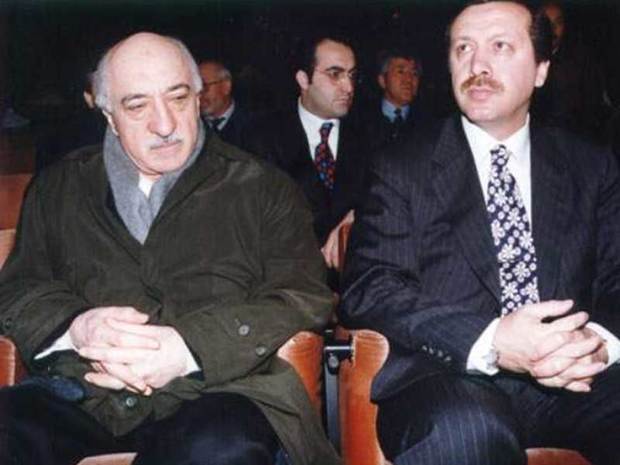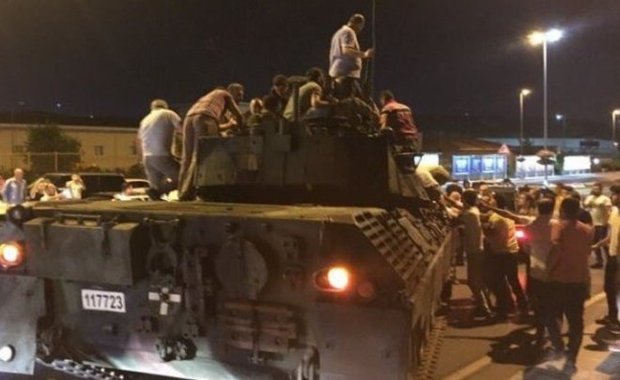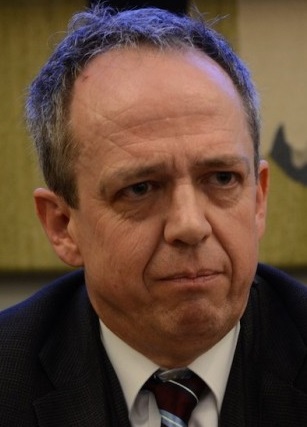Gareth Jenkins: ‘...in the past some of Gülen's followers cooperated with the CIA’
Nonresident Senior Fellow with the Joint Center's Silk Road Studies Program and Institute for Security and Development Policy Gareth Jenkins who is the author of numeours articles about modern Turkey talked to a correspondent of Realnoe Vremya and told that today there is a battle of two religious communions — Gülen and Erdoğan — on the political stage of the Republic of Turkey. The experts doesn't believe the information about the imminent putsch was given by Russian special services.
Gülen for the last 40 years has been trying to build up this big global network'
Who could organise what happened in Turkey – the Army, the Opposition, Fethullah Gülen's followers or other countries?
Gareth Jenkinks: 'If you had spend all that time building up this huge network, and then you stage a coup, it doesn't make a sense. But some of the people who were in the coup work close to the Gülen movement.' Photo: silkroadstudies.org
The simple answer is I don't know. But either those for the Opposition? No. Other countries? Also no. It's either some hard-line seculists in the Army, or it's Fethullah Gülen's followers or it's some kind of combination. I mean we still don't know because some of the people who were involved they were members of the Gülen movement. But this would be very strange because Gülen for the last 40 years has been trying to build up this big global network. He has a school or a charity in 160 countries around the world, millions of followers based on the idea of No Violence. If you had spend all that time building up this huge network, and then you stage a coup, it doesn't make sense. But some of the people who were in the coup work close to the Gülen movement. So, I don't know. Maybe they were, did it themselves but it was not an order from the movement. But it's very very strange. I've never seen anything like this in Turkey.
Erdoğan accused the USA of the preparation of the conflict. How can it hurt Turkey?
Particularly economically, I think. Fethullah Gülen is in the States. It means the US behind Fethullah Gülen. That is evidence to suggest that in the past some of Gülen's followers cooperated with the CIA, particularly at the end of the Soviet Union when Gülen's followers were active in Central Asia.
If they'd been the USA, they would have done it better. It was such a badly done operation. We are gonna have tensions. This accusation is appearing a lot from the AK Party people and the AK Party newspapers. They want Gülen to be sent to Turkey. It is not gonna happen. If there is gonna be tension now that there is between the U.S. and Turkey, it's gonna affect the economy, particularly foreign investment.
What lessons did the Turkish government take from these events?
Unfortunately, I think the lesson they've taken is that they can't trust anybody. We've seen already we've had some more than 10,000 people taken in the custody, more than 50,000 people sent from their jobs, these numbers are going to increase. And Erdoğan is only gonna trust people whom he knows supporting personally.
How the Naqshibandis and Nurcus announced their break-up
How can the consequences of the Turkish crisis and its solutions influence Russia and the relations of Erdoğan and Putin? Is it possible to say that Moscow benefited from it?
I think Moscow will benefit indirectly. Not too much what happened. Everybody agreed that was bad. But there is a disagreement now and a lot of criticism from the U.S. and from the EU about Erdoğan's reaction to the attempted coup. In my opinion, whenever the relations between Turkey with the U.S. get bad, it's going to help to benefit Russia because then it weakens NATO. Erdoğan is going to be looking more to be a little bit more friendly towards Russia.

Gareth Jenkins: 'If you go back a long way into the Turkish Islamist movement, both Erdoğan and Gülen formed the Turkish Islamist movement. But they come from different parts of it.' Photo: cerideimulkiye.com
Who is Gülen? Is his figure powerful? Does he have many supporters?
Yes, he is. I mean, he's extraordinary powerful. I've written about this movement. I'm one of their enemies. But I have to say that not everybody who supports him is bad. They've been very much weakened inside Turkey but in the rest of the world they are very strong. I mean some places in Africa, in the Balkans, in the U.S., in Washington. There they are still very strong.
He has millions of supporters. He has a presence in more than 160 countries. They control in some way or another billions of dollars with their companies, with their schools, with their charities. He is extraordinarily important.
What major conflicts Gülen and Erdoğan had?
It is a kind of complicated topic. If you go back a long way in the Turkish Islamist movement, both Erdoğan and Gülen formed the Turkish Islamist movement. But they come from different parts of it. So, they always were rivals. But Erdoğan belong to the Naqshbandis, Gülen comes from the Nurcus. These are two different traditions in the Islamist movement. When that party was founded in 2001, they formed like an alliance and a 'marriage' of communions against the secular establishment. They cooperated a lots against the seculists. Once the seculists were very much weakened, when only two powers left, they turned against each other. This is not really much about Islamism or about religion, this is much about power, I think.
'And Erdoğan can do whatever he wants'
Why did the coup fail?
When you actually look at the number of soldiers, tanks and planes the coup plotters had, it was very very small. The coup started after 10 o'clock at night on Friday. There are lots of reports that can confirm that it was actually due to start at 3 o'clock in the morning on Saturday. When they understood they would be discovered, they moved forward. It is possible and it might explain why those so few soldiers and planes took part.
Turkey has 78m people, 500,000 people in the Armed Forces, 250,000 people in the police. You cannot take over a country like this with 200 soldiers and about 10 planes and maybe 20 tanks. You can't do it. Maybe they originally were going to have more; even so, I don't think it would be enough to take control of the country militarily. I think what they were hoping was they would do these things, including what I saw they were closing the bridge across the Bosphorus, which doesn't have a real big military advantage but it's a very big public impact because we are all those who cross this bridge. So, I think what they were hoping was they would do some things. And they said they were doing this in the name of seculism, in the name of Atatürk, the founder of the Turkish Republic. They thought a lot of people inside the military and in the general public would come out and support them. So I think it's almost with a match you will start a fire. They thought they would be the match, and then the fire would take over the country. There was not any reaction at all. And I think that's the real reason that it failed.
Don't you think the real coup has begun only now judging by mass arrests?
Yes, in some way what we saw on Friday night was almost two attempted coups. One was inside the Turkish military against the high command, and the next one was by these soldiers against the civilian government. And what we've seen since is basically a civilian coup against all the laws in Turkey. And now the coup has a state of emergency. And Erdoğan can do whatever he wants. Not so many people are dying, lots of people died on Friday night. But in terms of the impact on the country, the biggest coup is taking place now.

Gareth Jenkins: 'Turkey has 78m people, 500,000 people in the Arm Forces, 250,000 people in the police. You cannot take over a country like this with 200 soldiers and about 10 planes and maybe 20 tanks. You can't do it.' Photo: haber7.com
A version of how the Turkish Intelligence Service knew about the staged coup from the Russian special services has appeared recently. What do you think about it?
I would be very happy if it was true because you want to see countries cooperating to stop coups. I haven't seen any evidence. What we do know is wherever they got it, when the Turkish intelligence services got this information, they used it very very badly. They did not tell the President for four hours, the PM learnt about the coup from some of his relatives who has seen it on the TV. There seems to be a big intelligence failure at the beginning not to catch these people before. And, afterwards, when they had the information and gave it to them, they just did not know how to use it.
Thank you for such an interesting interview!
Reference
Gareth Jenkins is a nonresident Senior Fellow with the Joint Center's Silk Road Studies Program and Institute for Security and Development Policy, and a regular contributor to its biweekly Turkey Analyst. He is a writer and analyst based in Istanbul, Turkey, where he has been resident since 1989. During his first ten years in Turkey, he worked as a journalist for international wire services, newspapers and periodicals, covering a broad range of political, economic and social issues related to Turkey and the surrounding region. In recent years he has focused primarily on analysis, contributing numerous articles, reviews and commentaries to scholarly journals and edited volumes and delivering presentations at seminars and conferences. His special fields of interest are civil-military relations, terrorism and security issues, and political Islam. He is the author of such books as Between Fact and Fantasy: Turkey's Ergenekon Investigation (2009), Political Islam in Turkey: Running West, Heading East? (2008), Muslim Democrats in Turkey? (2008),Context and Circumstance: The Turkish Military and Politics (2001).
The expert's articles and opinions are published in Bloomberg, World Politics Review, Reuters, The Telegraph and The Economist.
